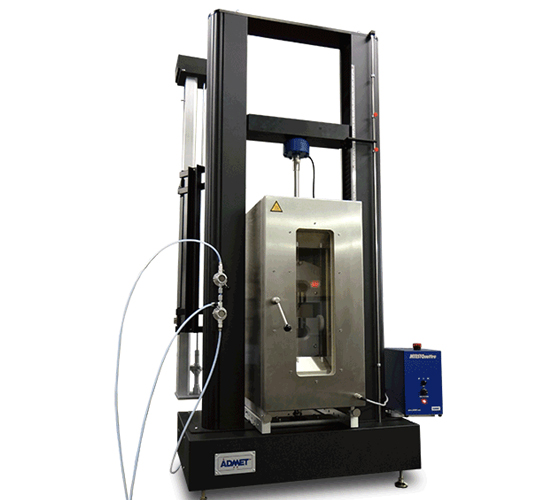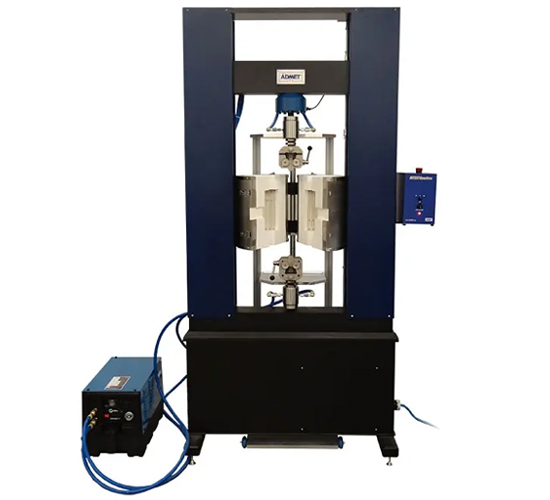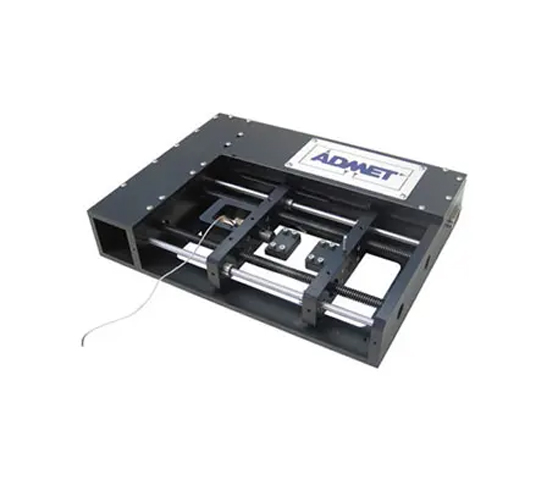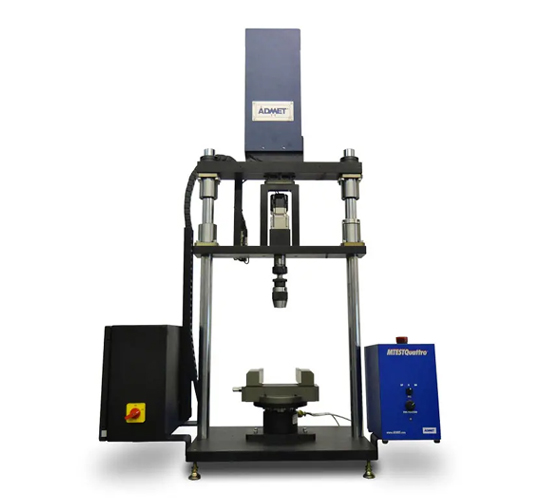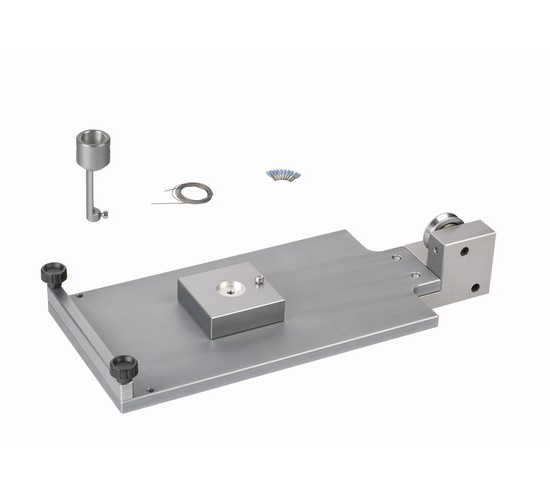
Coefficient of Friction Fixture: Universal Testing Machine Accessory for Plastic Film Testing
The Coefficient of Friction Fixture is an essential universal testing machine accessory designed to measure the coefficient of friction (COF) of plastic films and sheeting materials with high precision. This fixture is ideal for industries and research applications where friction characteristics are critical for product performance and quality assurance.
Features of Coefficient of Friction Fixture:
universal testing machine accessories, universal testing machine price, accessories, coefficient of friction fixture, material testing grips, plastic film testing.
Coefficient of Friction Fixture is an essential accessory designed for universal testing machines to measure the coefficient of friction (COF) between two materials. This fixture is crucial for assessing the frictional properties of materials, which is important for a variety of applications in industries like automotive, aerospace, packaging, and material science. It enables accurate, reliable testing to determine how different materials interact under various loading conditions.
The Coefficient of Friction Fixture is engineered to provide precise measurements by securely holding the materials being tested and ensuring consistent contact during the test. The fixture uses a proven mechanism to apply a controlled load to the specimen while measuring the force required to slide one material over another. This gives a direct and repeatable measurement of the coefficient of friction, which is essential for evaluating the performance and wear characteristics of materials.
This fixture is designed with versatility in mind. It can accommodate a wide range of material types, including metals, plastics, rubber, composites, and more. Its adjustable components allow for easy setup and the ability to test different sample sizes and shapes, making it suitable for various testing requirements.
Coefficient of Friction Fixture is built with high-quality materials to ensure durability and long-term reliability. It is optimized to handle a variety of test conditions and provide accurate data, even under heavy loads or extreme temperatures. The fixture is easy to install and integrates seamlessly with most universal testing machines, improving workflow efficiency in the laboratory or production facility.
For industries where understanding material friction is critical—such as in packaging, automotive parts, or machinery design—this fixture provides reliable results that can influence material selection, product design, and safety standards.
For more details on Coefficient of Friction Fixture, customization options, and universal testing machine price, contact us today.
Coefficient of Friction Fixture Features
The Coefficient of Friction Fixture is an essential tool for accurate and efficient material testing, offering versatility and precision in determining the friction properties of various materials.
Coefficient of Friction Fixture Specifications:
Coefficient of Friction Fixture Applications for Universal Testing Machines
Coefficient of Friction Fixtures are essential tools used in Universal Testing Machines (UTMs) to measure the coefficient of friction between two materials. This fixture helps determine the resistance to sliding or rolling motion, which is crucial for a wide range of applications across various industries. Below are the key applications for Coefficient of Friction Fixtures:
Applications for Universal Testing Machines (UTMs):
Friction Testing of Materials:
Coefficient of Friction Fixtures are commonly used with UTMs to evaluate the frictional properties of materials such as metals, plastics, rubber, and textiles. This is essential for industries where material performance under friction plays a critical role, such as automotive, manufacturing, and consumer products.
Plastic and Polymer Testing:
These fixtures help measure the friction between different plastics and polymers to assess their wear resistance and performance in sliding applications. Used with universal testing machines, they provide valuable data for manufacturing processes involving plastic components, such as gears, bearings, and seals.
Rubber Testing:
In the rubber industry, coefficient of friction fixtures is used to evaluate the frictional properties of rubber compounds, which are crucial for tire manufacturing, conveyor belts, and seals. The UTMs simulate real-world conditions to assess rubber’s performance in high-friction environments.
Textile and Fabric Testing:
Coefficient of Friction Fixtures are used in UTMs to measure the friction between textiles, fabrics, and different surfaces. This is critical for the textile industry, where friction affects wear resistance, fabric handling, and durability in products like garments, upholstery, and industrial fabrics.
Automotive Testing:
Used to measure the frictional forces between materials used in automotive components, such as brake pads, tires, and seals. This testing ensures that automotive parts function safely and efficiently under various conditions. UTMs equipped with friction fixtures provide accurate data for performance testing and material selection.
Surface Coatings and Lubrication Testing:
Coefficient of Friction Fixtures are applied to assess the effectiveness of lubricants and coatings by evaluating their impact on friction between two surfaces. This is essential for the automotive, aerospace, and manufacturing industries, where lubricants reduce wear and enhance the lifespan of machinery.
Wear and Tear Testing:
These fixtures are used to assess how materials wear down under repeated frictional forces. When integrated with UTMs, they provide valuable data on the wear resistance of materials, which is critical for industries like construction, aerospace, and consumer goods.
Material Selection for Manufacturing Processes:
For industries like manufacturing and construction, Coefficient of Friction Fixtures help evaluate materials for their performance under sliding conditions. This is crucial for selecting the right materials for machinery parts, tools, and other industrial applications where friction is a concern.
Biomedical Testing:
In the medical field, these fixtures are used to test the frictional properties of materials used in implants, prosthetics, and other medical devices. UTMs with friction fixtures provide valuable insights into how materials will behave when interacting with biological tissues or other medical devices.
Packaging Industry Testing:
The coefficient of friction fixture is used in the packaging industry to evaluate the slip characteristics of packaging materials such as films, papers, and foils. This is important for ensuring efficient handling, transport, and protection of products.
Frictional Testing for Consumer Goods:
Used to test materials in everyday consumer goods, including household items, clothing, and electronics, Coefficient of Friction Fixtures help determine how these items perform when subjected to frictional forces.
Advantages of Coefficient of Friction Fixtures:
Industry Applications:
Coefficient of Friction Fixtures, when used with Universal Testing Machines (UTMs), offer a comprehensive solution for measuring the frictional properties of materials. This is vital for industries that require precise testing to ensure the safety, durability, and performance of their products in real-world applications.
The Coefficient of Friction Fixture is a specialized accessory used in material testing machines to measure the frictional properties between two surfaces. This fixture is designed to test the static and dynamic coefficient of friction (COF) of materials, such as plastics, rubber, metals, and composites, under varying loads and conditions. It helps in determining how much resistance a material offers when in contact with another surface.
The Coefficient of Friction Fixture operates by applying a force to a test specimen (typically a material sample or surface) while it slides or is moved over a reference surface. The fixture measures the force of friction between the two surfaces and calculates the static or dynamic coefficient of friction by dividing the frictional force by the normal force acting on the specimen. This helps determine how easily or difficultly two materials will slide against each other.
The Coefficient of Friction Fixture can be used to test a wide range of materials, including:
Wood and paper
The fixture is commonly used in industries where friction properties are critical, including automotive, aerospace, packaging, and manufacturing.
With the Coefficient of Friction Fixture, the following tests can be conducted:
Effect of lubrication or surface treatments on friction performance.
To install the Coefficient of Friction Fixture:
Calibrate the testing machine as necessary to measure the force required for calculating the coefficient of friction.
Key features of the Coefficient of Friction Fixture include:
Durable construction to withstand repeated testing cycles.
Coefficient of Friction Fixtures are widely used in industries that require understanding and control of frictional forces, including:
Consumer goods (such as testing fabric or rubber-based products for wear).
The maximum load capacity of the Coefficient of Friction Fixture depends on the specific model of the fixture and the universal testing machine it is connected to. Typically, these fixtures can handle loads ranging from a few N to several kN, depending on the testing requirements. Refer to the manufacturer specifications for the precise load limits.
To maintain the Coefficient of Friction Fixture:
Check load cells and sensors for proper functioning.
Coefficient of Friction Fixtures are generally designed for room temperature testing, but some models may be suitable for use at moderately elevated temperatures. For high-temperature friction testing, it is advisable to check if the fixture is rated for such conditions, or use a fixture specifically designed for high-temperature environments.
The Coefficient of Friction Fixture typically comes with a one-year warranty against manufacturing defects. Extended warranties may be available, depending on the model and customer requirements.
Choosing Coefficient of Friction Fixtures offers several advantages, including:
Comprehensive technical support from to help with setup, testing, and troubleshooting.
